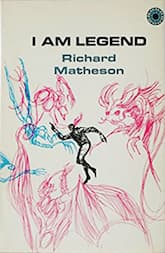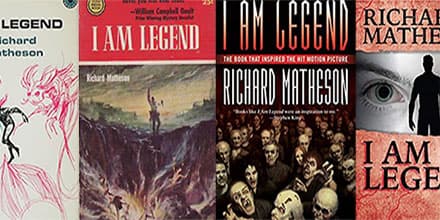I Am Legend
Critique • Quotes • At the movies
 First hardcover edition
First hardcover editionFirst publication
1954
Literature form
Novella
Genres
Science fiction, horror
Writing language
English
Author's country
United States
Length
Approx. 25,000 words
A legendary story
Critics may not have known what to make of it when it came out in 1954, but what has been made of I Am Legend since then has been several fields of popular fiction, multiple movie adaptations, numerous knockoffs, and works inspired in all media. It's probably safe to say many more people are familiar with parts of Richard Matheson's story through its impact on writing and other media than through its original pages.
And how original those pages are.
I Am Legend is a novella dripping with narrative ideas, as though a writer's career of speculative fictions have been jammed into one slim volume. This has confused some critics who have felt the work was direction-less, leaving too many plot ideas undeveloped. And yet for readers the through-story holds up brilliantly from premise to unexpected conclusion.
The ambiguities have also led to disagreements even about what kind of story this is, what genre it belongs to. Science fiction? Horror? Fantasy? And within those genres, what subgenre its narrative falls into. Hard or soft science fiction? Psychological horror? Last-person-on-earth? Post-apocalyptic? Vampire? Zombie? Dystopian? Pandemic?
Matheson's story has somehow influenced the creation, or re-creation, of those genres or subgenres. Horror and some of the darker science fiction writers, in particular, claim to have been inspired by I Am Legend. It's hard to imagine zombie or zombie-apocalypse stories over the past many decades—in print or on film—without I Am Legend showing a new way to look at them. Every story of worldwide epidemics owes something to Matheson.
The first odd thing that strikes you when you start reading it may be that it seems to be a last-human-left-alive tale (ho-hum) and yet the last man's story is narrated in the third-person, especially since the title is very first-person (hmm?). This might appear to be just an illogical choice of voice by the author but in the course of the work and with that last twist, it makes clever sense.
And his way of writing, seamlessly sliding in and out of his antagonist's head, gets us completely involved in the psychological drama therein.
Not your grandfather's zombies
Barricaded in his house every night, Robert Neville seems at first to be an everyman fighting off traditional vampires who fear sunlight, crosses, mirrors and garlic. During the day he runs around the city finding vampire lairs and driving stakes into their hearts, the traditional method of dispatching such alleged monsters. But some of the creatures he's warding off seem to resemble more the zombies of later fiction, the recently deceased rising from the dead to lumber about stupidly. Again it doesn't make sense at first but will eventually become clear.
In another departure from tradition, Neville struggles against his own atavistic impulses to carry out a program of scientific study of the creatures to find rational explanations for them. He learns they were created not by supernatural means but as a result of a bacterial infection spread among humans by insects following the devastation of a major war.
At several points the reader is led to expect Neville will discover a cure for the infection or discover how to overcome the enemy hordes, but nothing turns out quite as you anticipate.
I don't think it's too big of a spoiler to say Neville eventually learns he's not the last person human alive, though how this discovery comes about and its meaning may surprise.
As in the best of the genres, both before and after I Am Legend, the story leaves you questioning what it means to be human and where our humanity is taking us.
Not that there's any chance of such ridiculous events ever taking place—the "science" really is far-fetched. But by making the ridiculous and the far-fetched possibilities seem credible in this unusual story, Matheson prods us to think about our actual selves, what it means to be human, and our future as a species.
But if you hate writing that makes you think, well, you can enjoy it as just a great read. And let it work its magic on you subconsciously.
— Eric
Critique • Quotes • At the movies


